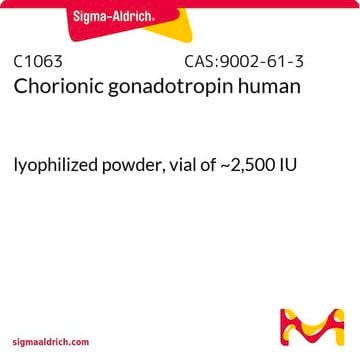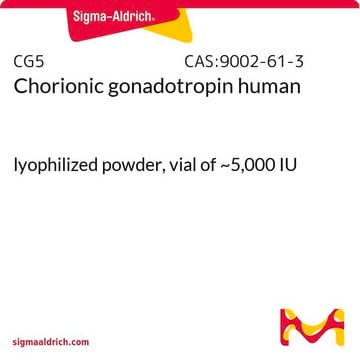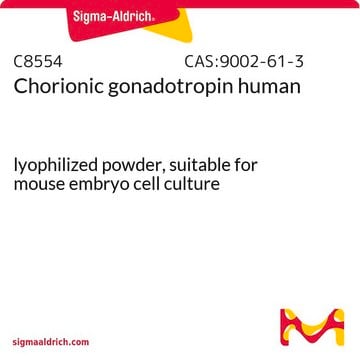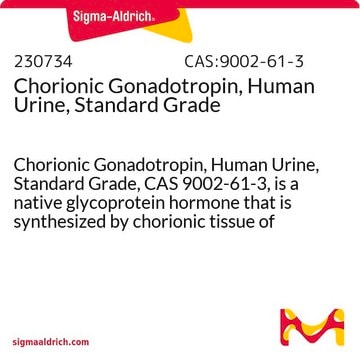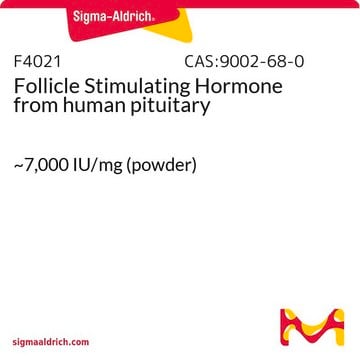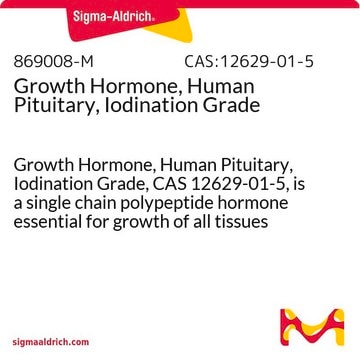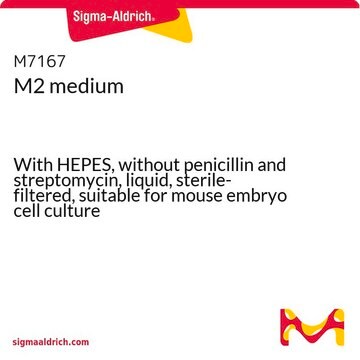C0434
Chorionic gonadotropin human
lyophilized powder, from human pregnancy urine
Synonym(s):
Choriogonin, HCG
Sign Into View Organizational & Contract Pricing
All Photos(1)
About This Item
Recommended Products
biological source
human pregnancy urine
Quality Level
sterility
sterile-filtered
form
lyophilized powder
potency
~13,000 I.U. per mg
mol wt
37.9 kDa
impurities
HBsAg, HCV and HIV-1/HIV-2, tested negative
solubility
water: 2 mg/mL, clear, colorless
UniProt accession no.
shipped in
ambient
storage temp.
−20°C
Gene Information
human ... CGA(1081)
Looking for similar products? Visit Product Comparison Guide
General description
Glycoprotein hormone consisting of a 92-amino acid α-chain which is identical to that of LH, FSH, and TSH; and a distinct 149-amino acid β-chain. Produced by chorionic tissue and responsible for maintaining the corpus luteum during early pregnancy. Also produced by trophoblast cell neoplasms, which are marked by elevated free hCG β-chains and hyperglycosylated hCG.
Biochem/physiol Actions
Human chorionic gondadotropin (hCG) may be used as an alternative to PMSG to induce ovulation in laboratory animals. When hCG was injected into laboratory animals via intravenous (i.v.), intraperitoneal (i.p.), or subcutaneous (s.c.) methodstet, the effective dose values for 50% of the animals (ED50) per animal and per body weight (kg) in parenthesis were as follows:
Mice: i.v. 0.2 (7.7) I.U.; i.p. 0.3 (11.5) I.U.; s.c. 0.7 (26.9) I.U.
Syrian hamsters: i.v. 1.0 (9.5) I.U.; i.p. 1.8 (17.1) I.U.; s.c. 2.6 (24.8) I.U.
Rats: i.v. 1.3 (4.6) I.U.; i.p. 3.5 (12.3) I.U.; s.c.7.5 (26.3) I.U.
Using PMSG, the ED50 values per animal and per body weight (kg) in parenthesis were as follows:
Mice: i.v. 0.8 (30.8) I.U.; i.p. 2.0 (76.9) I.U.; s.c. 2.8 (107.7) I.U
Syrian hamsters: i.v., 3.6 (34.3) I.U.; i. p., 8.0 (76.2) I.U.; s.c., 13.2 (125.7) I.U.
Rats: i.v., 6.0 (76.8) I.U.; i p., 20.8 (73.0) I.U.; s.c., 76.8 (269.5) I.U.
Mice: i.v. 0.2 (7.7) I.U.; i.p. 0.3 (11.5) I.U.; s.c. 0.7 (26.9) I.U.
Syrian hamsters: i.v. 1.0 (9.5) I.U.; i.p. 1.8 (17.1) I.U.; s.c. 2.6 (24.8) I.U.
Rats: i.v. 1.3 (4.6) I.U.; i.p. 3.5 (12.3) I.U.; s.c.7.5 (26.3) I.U.
Using PMSG, the ED50 values per animal and per body weight (kg) in parenthesis were as follows:
Mice: i.v. 0.8 (30.8) I.U.; i.p. 2.0 (76.9) I.U.; s.c. 2.8 (107.7) I.U
Syrian hamsters: i.v., 3.6 (34.3) I.U.; i. p., 8.0 (76.2) I.U.; s.c., 13.2 (125.7) I.U.
Rats: i.v., 6.0 (76.8) I.U.; i p., 20.8 (73.0) I.U.; s.c., 76.8 (269.5) I.U.
Linkage
Similar to C2047, but from a different supplier.
Certificates of Analysis (COA)
Search for Certificates of Analysis (COA) by entering the products Lot/Batch Number. Lot and Batch Numbers can be found on a product’s label following the words ‘Lot’ or ‘Batch’.
Already Own This Product?
Find documentation for the products that you have recently purchased in the Document Library.
Hanieh Rezaee et al.
Cell journal, 24(10), 596-602 (2022-10-20)
The most common mutation in cystic fibrosis (CF), (ΔF508-CFTR), results in impaired protein maturation, folding and transportation to the surface of the cell. As a consequence of impaired protein maturation and/or transport from the extracellular matrix to the cell, different
Nikola Sekulovski et al.
FASEB journal : official publication of the Federation of American Societies for Experimental Biology, 34(2), 2376-2391 (2020-01-08)
Recent studies have demonstrated an essential role for insulin signaling in folliculogenesis as conditional ablation of Igf1r in primary follicles elicits defective follicle-stimulating hormone responsiveness blocking development at the preantral stage. Thus the potential role of insulin action in the
Karen E Racicot et al.
Reproductive sciences (Thousand Oaks, Calif.), 21(10), 1274-1280 (2014-02-13)
Embryo implantation, which is an absolute requirement for reproduction, starts with blastocyst apposition to the uterine endometrium, followed by attachment to the endometrial surface epithelium. Recent clinical studies reported an increase in implantation and pregnancy rates among women receiving intrauterine
Tammy Z Movsas et al.
Frontiers in pediatrics, 5, 232-232 (2017-11-23)
Though the human fetus is exposed to placentally derived human chorionic gonadotropin (hCG) throughout gestation, the role of hCG on the fetal brain is unknown. Review of the available literature appears to indicate that groups of women with higher mean
Ling Shuai et al.
Current protocols in stem cell biology, 31, 1A-1A (2014-11-05)
In this unit we introduce the derivation and genetic modification of mouse haploid embryonic stem (ES) cells. We detail how to produce haploid embryos and the subsequent ES derivation and cell culture. We further introduce readers to the intracytoplasmic injection
Our team of scientists has experience in all areas of research including Life Science, Material Science, Chemical Synthesis, Chromatography, Analytical and many others.
Contact Technical Service
